

The Concept of Truth that Matters. Bibliography Cormier, Harvey, The Truth is What Works, William James Pragmatism and the Seed of Death, Rowman & Littlefield Publishers, Inc.
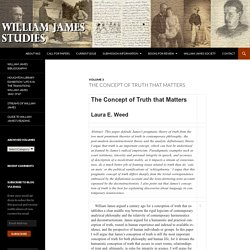
Lanham, Maryland, 2001. Damasio, Antonio R., Descartes’ Error, Quill/Harper Collins Books, New York, Foucault, Michel, “The Formation of Objects” in The Archeology of Knowledge, and the. James, William. 1890. "The Self And Its Selves" (161-166). - DJJR Sociology. James, William. 1890.
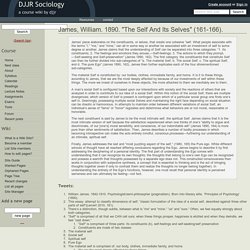
"The Self And Its Selves" (161-166). James’ piece elaborates on the constituents, or selves, that create one cohesive “self. William James Table of Self Concept. — To understand William James you must consider He was a “pluralist“ with regard to James influence, there are countless ways to define “self” or , “self concept” as modern psychologists say… ― so why define ” self ” all ?

To argue if their is a “self or soul or that there is no self ” how useful is it other than friendly ramblings over a beer at the bar ? At first, when the laymen views psychiatry and medicine , he may ponder: does Anxiety disorder bipolar or personality disorder , this disorder that disorder really exist? “Truth happens to an idea.” James makes a case for his version self concept , because its serves a need or a purpose that “happens” . or happens repetitiously. William James on the Self. Seminar on Self Constructs (EDS 771G)Week 2 - William James on the Self Division of Educational Studies - Emory University 1.
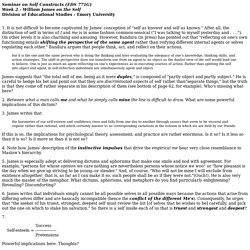
It is not difficult to become captivated by James' conception of "self as knower and self as known. " After all, the distinction of self in terms of I and me is in some fashion common-sensical ("I was talking to myself yesterday and . . . "). On other levels it is also charming and amusing. Classics in the History of Psychology. Classics in the History of Psychology An internet resource developed by Christopher D.
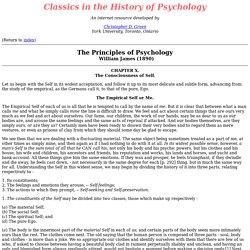
Green York University, Toronto, Ontario (Return to index) James, William. 1890. "The Self And Its Selves" (161-166). - DJJR Sociology. Pragmatists with phenomenology. Fandom powered by Wikia. Assessment | Biopsychology | Comparative | Cognitive | Developmental | Language | Individual differences | Personality | Philosophy | Social |Methods | Statistics | Clinical | Educational | Industrial | Professional items | World psychology | Philosophy Index:Aesthetics · Epistemology · Ethics · Logic · Metaphysics · Consciousness · Philosophy of Language · Philosophy of Mind · Philosophy of Science · Social and Political philosophy · Philosophies · Philosophers · List of lists This article needs rewriting to enhance its relevance to psychologists..Please help to improve this page yourself if you can..

Pragmatism is a philosophical movement that includes those who claim that an ideology or proposition is true if it works satisfactorily, that the meaning of a proposition is to be found in the practical consequences of accepting it, and that unpractical ideas are to be rejected. The Meaning of Truth (by William James) THE pivotal part of my book named Pragmatism is its account of the relation called ’truth’ which may obtain between an idea (opinion, belief, statement, or what not) and its object. ’Truth,’ I there say, ’is a property of certain of our ideas.
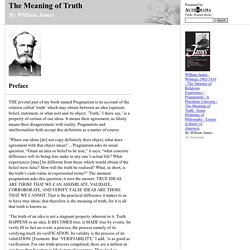
It means their agreement, as falsity means their disagreement, with reality. Pragmatists and intellectualists both accept this definition as a matter of course. ’Where our ideas [do] not copy definitely their object, what does agreement with that object mean? ... William James. (ca. 1895, in , ed. by Henry James, Boston, 1920) 1.

Chronology of James's Life 1842. Fandom powered by Wikia. Assessment | Biopsychology | Comparative | Cognitive | Developmental | Language | Individual differences | Personality | Philosophy | Social |Methods | Statistics | Clinical | Educational | Industrial | Professional items | World psychology | Philosophy Index:Aesthetics · Epistemology · Ethics · Logic · Metaphysics · Consciousness · Philosophy of Language · Philosophy of Mind · Philosophy of Science · Social and Political philosophy · Philosophies · Philosophers · List of lists William James (January 11, 1842, New York – August 26,1910, Chocorua, New Hampshire) was a pioneering American psychologist and philosopher.He wrote influential books on the young science of psychology, psychology of religious experience and mysticism, and the philosophy of pragmatism.

William James was born in New York, son of Henry James, Sr., an independently wealthy and notoriously eccentric Swedenborgian theologian well acquainted with the literary and intellectual elites of his day. Cash Value of Meaning and Truth. To better understand William James’s metaphor of the Cash Value of Truth, I would like to make a case that “Cash value of Meaning” would be an improved word choice for today.
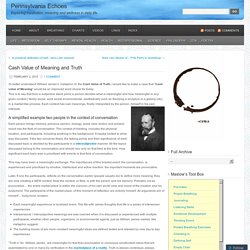
This is to say that from a subjective stand point, a person decides what is meaningful and how meaningful in any given context ( family social, work social environmental, aesthetically such as Studying a sculpture in a gallery) etc), in a market like process. Each context has own meanings, finally interpreted by the person, himself in his own interests. A simplified example two people in the context of conversation. Each person brings memory, previous opinion, biology, world view, diction and present mood into the field of conversation. On Being Empirical, Rational and Epistemologally Plural. An old Economist joke revised: Two economy professors walk into into a crowded bar . One pointed to the ground and says “look! American psychologist and philosopher.
William James, (born Jan. 11, 1842, New York, N.Y., U.S. —died Aug. 26, 1910, Chocorua, N.H.) American philosopher and psychologist, a leader of the philosophical movement of Pragmatism and of the psychological movement of functionalism. Early life and education James was the eldest son of Henry James, an idiosyncratic and voluble man whose philosophical interests attracted him to the theology of Emanuel Swedenborg. One of William’s brothers was the novelist Henry James. PDF:William James and the Cash Value Metaphor.